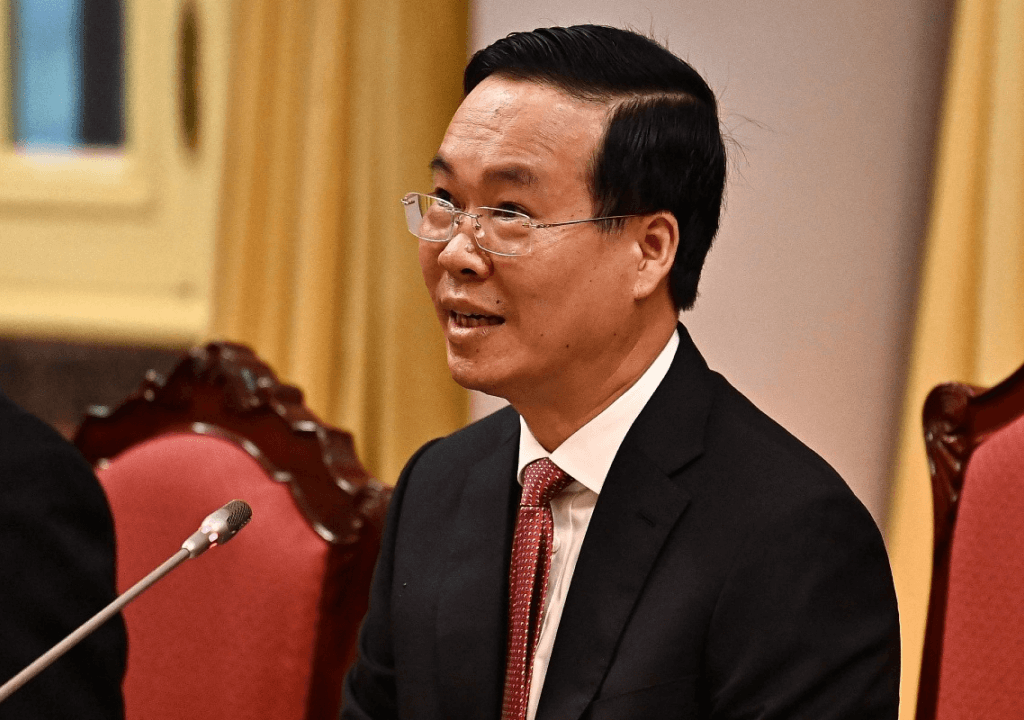Vietnam’s “Blazing Furnace” Effect: President Vo Van Thuong Steps Down After Just Over A Year

Vietnam witnesses its second president departing within two years. President Vo Van Thuong, the youngest ever to hold the position in Vietnam’s history, steps down from his role as president after just 12 months and 19 days in office. The cause of his resignation remains unclear. State media, citing an announcement from the Central Committee of the Communist Party of Vietnam, suggests that President Vo Van Thuong’s actions and shortcomings have negatively impacted public perception and the reputation of the party and the state. However, specific details about these alleged violations have not been disclosed. This Stepping down occurs amid an administration-level campaign against corruption, dubbed the “blazing furnace” by Vietnam’s general secretary and leader Nguyen Phu Trong, which has led to the scrutiny and prosecution of thousands of officials, from top ministers to low-level bureaucrats.
In Vietnam’s political hierarchy, the presidency is the second most significant post within the confines of the country’s one-party system. However, the paramount position is that of the Communist Party General Secretary, currently occupied by Trong, who, at 79 years old, has held the post since 2011. Consequently, the resignation of the president is not expected to directly alter the nation’s policies. Nevertheless, it attracts attention due to its potential ramifications for succession, particularly regarding the 54-year-old who some experts speculated could succeed Trong.
President Vo Van Thuong rose to the presidency owing to his close relationship with Trong. He assumed the presidency after being introduced at an extraordinary meeting of the Party Central Committee on 1st March of 2023, succeeding Nguyễn Xuân Phúc following Phúc’s resignation due to corruption scandals. Thuong quickly emerged as a top contender for the presidency following Phúc’s departure. However, now that he appears to have fallen out of favor, he is resigning from his post. Võ Thị Ánh Xuân, serves as the Acting President of Vietnam since March 2024, having previously held this position for two months in 2023.
The recent changes in high-level leadership, a rare occurrence in Vietnam, have sparked concerns among analysts and potential investors. Vietnam is often seen as the “Next China” in Asia, drawing significant investment interest as companies seek to diversify away from China amid escalating tensions between Beijing and Washington. Despite Vietnam’s appeal as a key investment destination, political instability has resulted in the postponement or cancellation of several critical meetings, including those involving the World Bank president and representatives from the Royal Dutch Authority. While the foreign direct investment (FDI) sector has been relatively insulated from the anti-corruption campaign, the prevailing uncertainty may cause investors to adopt a cautious approach, monitoring developments in Vietnam’s increasingly uncertain political landscape.
For a nation that often prides itself on political stability, the resignations of two presidents in less than two years raise concerns. Thuong’s departure also casts doubts on Vietnam’s future leadership, especially with the next National Congress scheduled for 2026. With his youth and close ties to General Secretary Trong, Thuong was viewed as a strong contender for leadership, making his exit a significant loss for other potential candidates.
Furthermore, Thuong’s departure could inadvertently exacerbate a consequence of the anti-corruption campaign, wherein officials opt for passivity to prevent making mistakes, thereby hindering progress on critical issues. In numerous nations, heightened scrutiny of corruption often leads to the rejection of development initiatives and stalls progress. Vietnam is likely to experience similar effects. Nevertheless, it’s evident that such actions will bolster anti-corruption efforts and influence the nation’s reputation, contributing to long-term development.
According to the state-controlled Tuoi Tre news website, the Vietnamese parliament endorsed Thuong’s resignation during a highly unusual closed-door session. Discussions regarding the successor to Vo Van Thuong are on the brink of commencement. The individual assuming this role will collaborate closely with the existing framework. It is paramount to uphold and enhance Vietnam’s investment-attracting strategy to distinguish the nation as a symbol of “Good and Democratic” manufacturing hub, diverging from China’s reputation for being “Bad and Authoritarian”.




